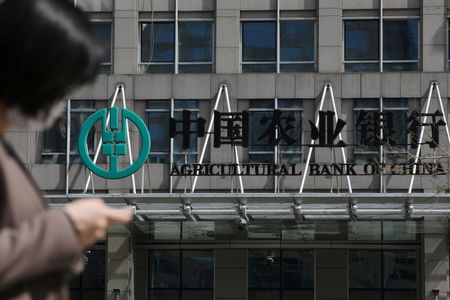BEIJING (Reuters) -Some Chinese state-owned banks will soon lower interest rates on existing mortgages, three sources familiar with the matter said on Tuesday, as Beijing ramps up efforts to revive the debt crisis-hit property sector and bolster a sputtering economy.
The quantum of the cut on existing mortgages, which, if implemented, will be the first such move in China since the global financial crisis, would be different for different types of clients and in different cities, said the sources.
The reduction could be as much as 20 basis points in some cases, said the sources, who declined to be named as they were not authorized to speak to the media.
The country’s central bank, the People’s Bank of China (PBOC), did not immediately respond to Reuters’ request for comment after business hours.
The reduction in existing mortgage rates will come amid several other property, economic and market support measures Beijing has announced over the past few weeks, as concerns mount about the health of the world’s second-largest economy.
The property sector, which accounts for roughly a quarter of the economy, has lurched from one crisis to another since 2021, and contagion fears deepened this month after liquidity stress in leading developer Country Garden became public.
Chinese lenders were widely expected to cut interest rates on existing mortgages after the PBOC earlier this month said that it would guide commercial banks to do so.
The central bank’s proposal to cut rates, which came after a wave of early repayments of mortgage debt, aims to reduce the interest rate costs for homebuyers and to boost consumption in a slowing economy.
China has been cutting new mortgage rates since last year to boost sales in its moribund property market, but the main result so far has simply been a rush by households paying off existing mortgages early, squeezing banks’ profits.
Lowering existing mortgage rates is expected to further weigh on the banking sector’s net interest margin (NIM) – a key gauge of profitability – which fell to a record low at the end of the second quarter, official data showed.
DEPOSIT RATES
Chinese banks have been battling headwinds such as lower lending rates and pressure from the government to prop up the economy, as well as bad debt related to property developers and local government financing vehicles (LGFV).
China’s mortgage loans totalled 38.6 trillion yuan ($5.29 trillion) at the end of June, representing 17% of banks’ total loan books.
Zhu Qibing, chief macro analyst at BOC International China, estimates the weighted average rate of new mortgages is 4.11%, while the average rate on all existing mortgages is at least 100 basis points higher.
Citigroup in a note this month said that the repricing of existing high-yielding mortgages would further add to Chinese banks’ NIM pressure and dampen their profitability and lending capability.
Adjusting existing mortgage rates is conducive to easing pressure on banks from mortgage prepayment, Lin Li, vice president of Agricultural Bank of China Ltd, the country’s No.3 lender by assets, said earlier on Tuesday.
The bank would draft detailed implementation rules on rate cuts after policies on this become clear, he said. The lender reported a drop in its NIM to 1.66% at the end of June from 1.7% at the end of March.
Chinese banks’ net interest margin would face downward risks in the second half of this year, Fu Wanjun, Agricultural Bank of China’s president, said.
To soften the hit on the margins, the three sources said that major state banks would also lower interest rates on some fixed-term deposits, and the quantum of cuts would range from 10 basis points to 25 basis points.
Cutting deposit rates could help banks to maintain a proper level of NIM, one of the sources said.
Analysts have said China last week did not opt for a broad rate cut that would further depress banks’ narrow net interest margins, instead deferring to banks to cut their deposit rates and give themselves room to cheapen mortgages.
($1 = 7.2916 Chinese yuan renminbi)
(Reporting by Xiangming Hou, Rong Ma, Ziyi Tang and Ryan Woo in Beijing, Selena Li in Hong Kong; Editing by Sumeet Chatterjee, Alex Richardson and Sharon Singleton)

